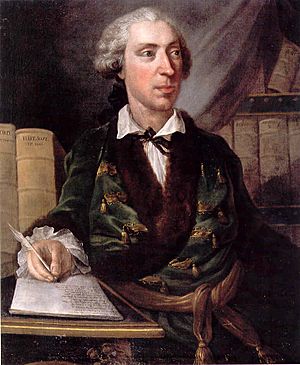William Hamilton (Jacobite poet) facts for kids
Quick facts for kids
William Hamilton
|
|
|---|---|
 |
|
| Born | 1704 Ecclesmachan, West Lothian |
| Died | 25 March 1754 Lyon |
| Resting place | Abbey Church, Holyrood |
| Language | English |
| Nationality | Scottish |
| Citizenship | British |
| Genre | Poetry |
William Hamilton (1704–1754) was a Scottish poet. He was known for supporting the Jacobite movement.
Life of a Scottish Poet
William Hamilton was born in 1704 at his family's home in Ecclesmachan, West Lothian, Scotland. His father, James Hamilton, was a lawyer. William became the owner of the family estate in 1750 after his older brother passed away.
William was often unwell and preferred writing poetry to social events. From a young age, he started writing poems, and his friends really liked them.
Between 1724 and 1727, he wrote songs for a collection called Tea Table Miscellany by Allan Ramsay. He also helped promote Ramsay's poem, The Gentle Shepherd. This poem was dedicated to Susanna Montgomery, Countess of Eglinton.
Supporting the Jacobites
William Hamilton strongly supported the Stuarts, a royal family who wanted to reclaim the British throne. These supporters were called Jacobites. In his poem Gladsmuir, Hamilton celebrated the Jacobite victory at the Battle of Prestonpans.
After the Battle of Culloden, which the Jacobites lost, William had to hide in the Scottish Highlands. He wrote a poem called A Soliloquy wrote in June 1746, which showed how sad and troubled he felt.
Eventually, he managed to escape to France. Later, with help from powerful friends, he was allowed to return to Scotland. However, the stress of his experiences had weakened him. He could not stay in Scotland and spent his last days in Lyon, France. He died there from a lung illness on March 25, 1754. His body was brought back to Scotland and buried in the Abbey Church, Holyrood.
William Hamilton's Family
William Hamilton was married twice. His son, James, from his first marriage, inherited the family estate. James's mother was a daughter of Sir James Hall.
 | Ernest Everett Just |
 | Mary Jackson |
 | Emmett Chappelle |
 | Marie Maynard Daly |

